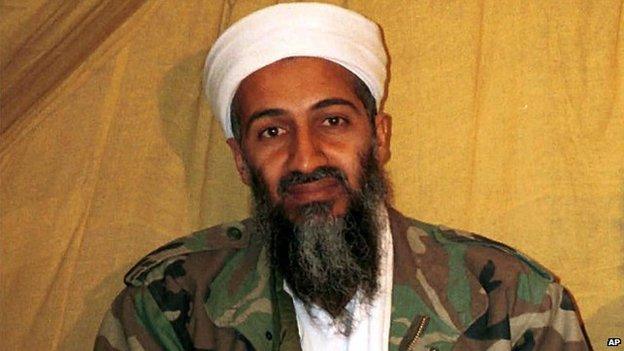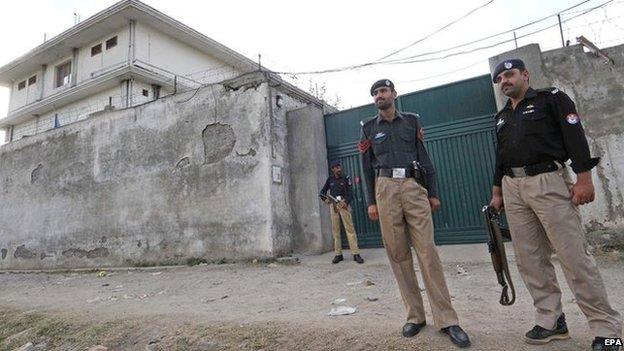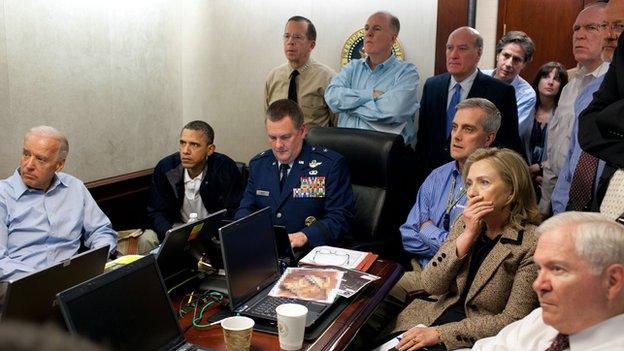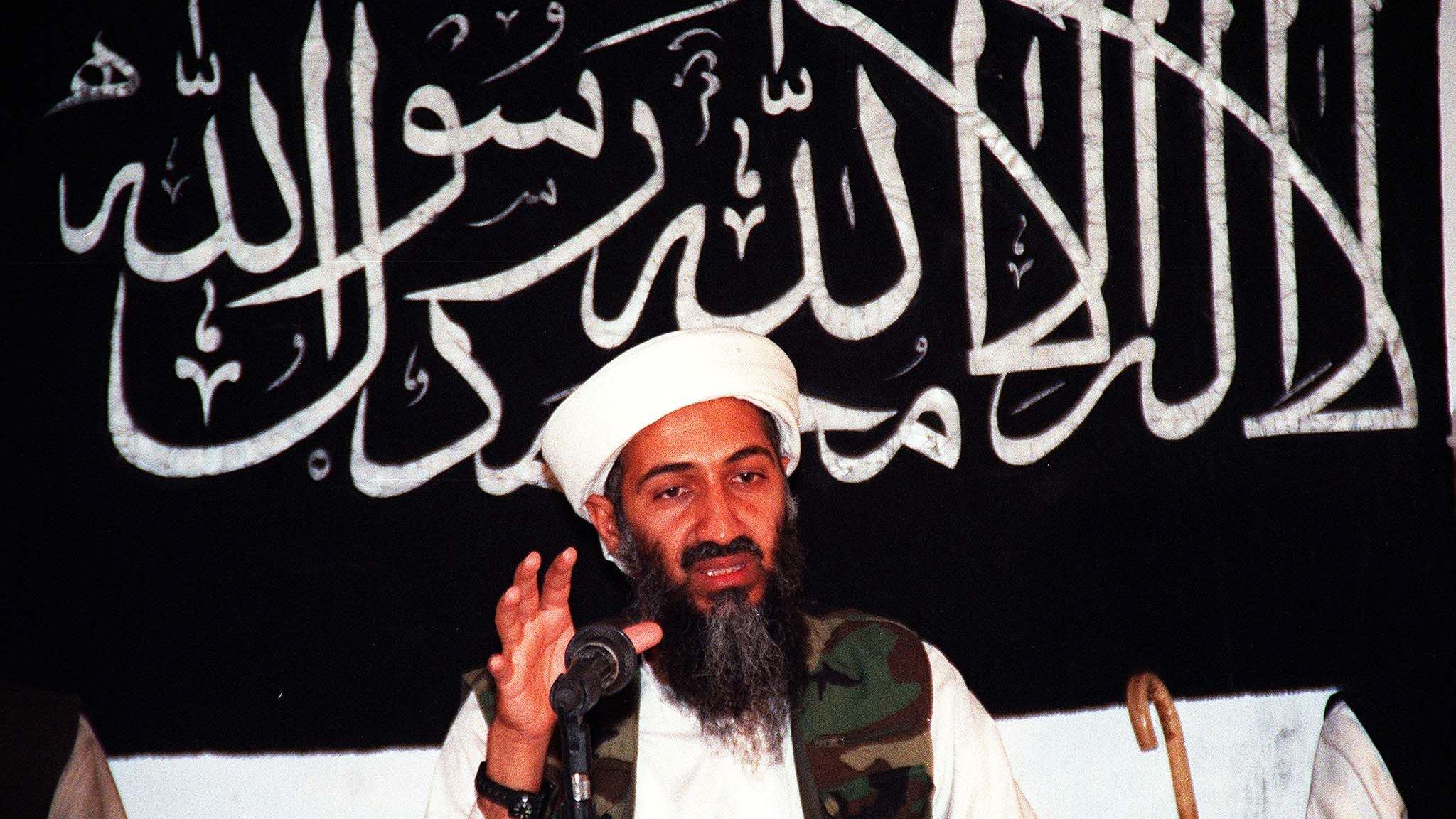Have we been told the truth about Bin Laden's death?
- Published

A recent controversial account of the death of Osama Bin Laden claims there was a conspiracy at the highest levels of the US and Pakistani government to assassinate him.
I have been investigating al-Qaeda and Bin Laden for the BBC for nearly two decades - a quest which has taken me from the caves of Tora Bora to the high-walled Pakistani compound where he met his bloody end. So is there any truth in this latest theory?
Seymour Hersh, a veteran US investigative journalist, has embarrassed US governments before with revelations about the My Lai massacre in Vietnam and abuses at Abu Ghraib prison in Iraq.
He laid low for several weeks after a mauling in much of the American press but eventually agreed to speak to me about his article published in the London Review of Books, external.
Mr Hersh claims that Pakistani intelligence - the ISI - were holding Bin Laden prisoner for nearly six years in the garrison town of Abbottabad and just handed him over to the Americans in a staged raid. According to Mr Hersh the official US account is therefore "a fairytale."
Michael Morell, the deputy director of the CIA who led the intelligence gathering and was in the CIA operations centre on the night of the raid in 2011, gave me his insider's account - and his view of Mr Hersh's theory. "It's rubbish, rubbish, almost every sentence is inaccurate," says Mr Morell.

Pakistani police guard Bin Laden's compound after the raid in 2011.
The CIA's account has always hinged on the courier, an al-Qaeda henchman who they say was tracked over eight years until he led them to Bin Laden's compound.
At the time of his death I revealed on Panorama that the ISI had given the CIA a mobile phone number without knowing its significance and that US surveillance of that number led eventually to the courier. Several CIA analysts and top American officials have testified to the discovery and tracking of the courier.
However Mr Hersh rejects that and says instead that the key figure was an un-named "walk-in" - a retired Pakistani military intelligence officer. He came to the US embassy in Islamabad in August 2010 and told the CIA his country was hiding Bin Laden - in return for much of the $25 million US reward.
Mr Hersh argues that knowledge of Bin Laden's whereabouts went right to the top of the Pakistan army and intelligence service. The CIA rejects this view, saying that the Pakistani top brass did not know.
Did Pakistan know where Bin Laden was hiding?
There is one other possible explanation however - the murky history of rogue elements within Pakistan's military and intelligence service sympathetic to Islamic militants.
'They were hiding him'
It is possible someone knew about or helped shelter Bin Laden. And it seemed incredible to me when I went to the Abbottabad compound before it was demolished that he could have lived right under the nose of Pakistan's military elite close to the country's military academy.
Carlotta Gall, who reported for the New York Times from Pakistan, supports Mr Hersh's account of knowledge at the top level of the army and intelligence service. She learned from a local source that the ISI had a specific Bin Laden desk run by one man. "They were hiding him and keeping him in some sort of protective custody," she says.
But some respected security experts dispute that and say it is just not plausible that the top levels knew about Bin Laden.
The problem for Mr Hersh is that his account is largely based on one American source, a retired senior intelligence officer in the US government who he does not name. Mr Morell dismisses that, saying this person was never in the meetings he was in - meetings which were completely different to Mr Hersh's account.
Events on the night of the raid to kill Bin Laden still raise questions. He was shot dead within 12 minutes of the first Seals - members of the US Navy's special operations force - landing.
But one of the helicopters crashed, there was shooting and blasting of doors and some Seals were on the ground for 40 minutes.

President Obama and his team following the mission against Bin Laden from the White House Situation Room
Neighbours alerted the local police but they were told to stand down by the Abbottabad army command. So is it possible the Americans warned the Pakistanis at the last minute about a raid on a high-value target - without saying who, and that local authorities turned a blind eye? Some security analysts in Pakistan favour this theory.
One of Mr Hersh's most shocking allegations - that US Navy Seals threw parts of Bin Laden's body out of the helicopter - is not based on speaking to the Seals involved but on access to some of their de-briefings.
Howard Wasdin, a former Seal, knows men who were on the operation. "Mr Hersh is being really irresponsible, dangerous," he told me angrily. "I don't know any Seal with the deviation of character who would consider dismembering another human being."
There is wider scepticism over the official US account that Bin Laden's body was buried at sea. Michael Morell told me he had seen photos and video of the burial but deflected my question whether we would ever see them, saying it was a matter for the White House.
Michael Scheuer, who ran "Alec Station", the special CIA unit which hunted for Bin Laden, believes it was a mistake not to publish pictures of Bin Laden's body and told me "I don't know why they did not do that but secrecy breeds conspiracy theories."
Michael Morell speculates that Mr Hersh may have been peddled a story by the ISI as a way of easing their embarrassment and shame over the American raid.
But Mr Morell concedes there are parts of the US account the world may never be told. "A hundred per cent of the story that's out there is true - but not a hundred per cent of the story is out there," he admits.
Osama Bin Laden's story did not end with his death - it continues to fascinate the world. As long as there are nagging questions and details that still do not add up there is likely to be more speculation about who knew what and when about his life and his killing in that compound.
This World: The Bin Laden Conspiracy? is on BBC Two at 22:00 BST (23:20 BST in Northern Ireland and Wales) on 17 June 2015 and available later via BBC iPlayer.
- Published20 May 2015

- Published11 May 2015